ALUMNI PROFILES
Cultural Competence Means Better Patient Care
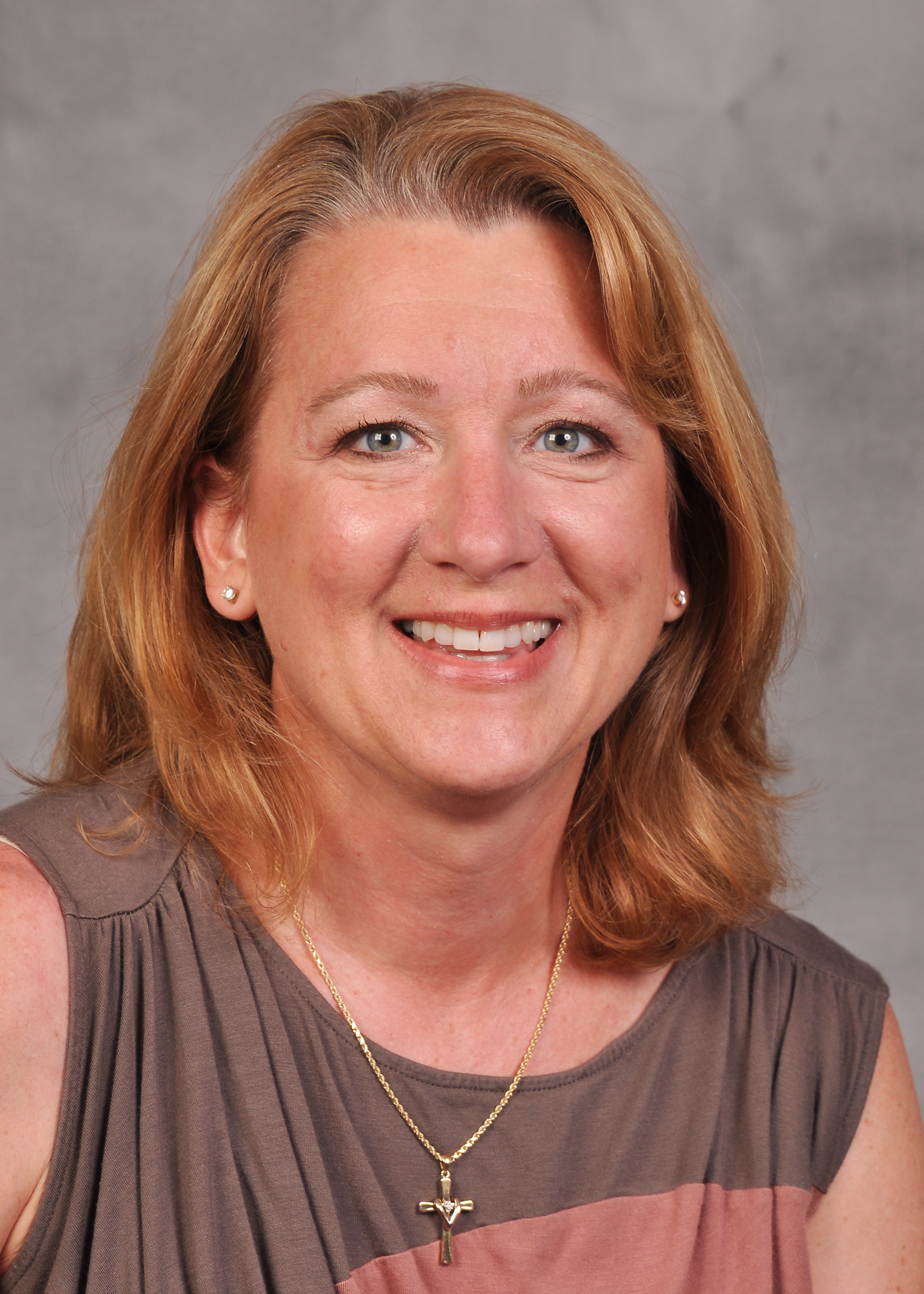 |
Theresa Morse, FNP, RN, BS ‘10/MS ‘12
|
February 2014 -- Having taken part in her second 100-mile bike ride for Missing and Exploited Children, Theresa (Terri) Morse, MS, RN-BC, FNP-C, seems propelled by her commitment to raise awareness and improve the lives of children. Near and dear to her heart are the children she works with at the Golisano Children’s Hospital University Pediatric and Adolescent Clinic (UPAC).
Terri applies the theory that, “If we understand who the patients are as individuals, we are better able to treat them. Cultural competence is critical to ensure good patient outcomes. Our pediatric clinic often looks like the United Nations. We have a large population of refugees from Iraq, Somalia and Burma,” she explained.
Terri observed a “disconnect” between the negative results on the clinic’s patient satisfaction surveys and the positive compliments the staff was hearing directly from patients and their families. To find out why, she reviewed the research and determined that such minority patients are less likely to return surveys. This led to Terri's collaboration with a Master’s in Public Health student, Sarah Irish, to design a study with a questionnaire that was written in English as well as in Arabic.
Once the questions were written in the patient's language, “the response rate and scoring were virtually 100 percent positive,” according to Terri. “The results indicated that the health care providers listened carefully, talked in a way the patients could understand, and respected what their patients had to say. This reinforced what we had been hearing, and brought to light the need to have surveys written in the patient’s primary language.”
Terri’s project has been recognized with a research award by the STTI Omicron Alpha Chapter, and is being submitted to the Journal of Immigrant and Refugee Healthcare. In addition, she teaches learning units on culturally effective healthcare at Upstate and professional workshops.
“Hopefully, my passion encourages others to become more sensitive and knowledgeable of cultural differences in an effort to provide culturally effective healthcare,” said Terri.
Education, Hard Work Enrich Alum’s Career
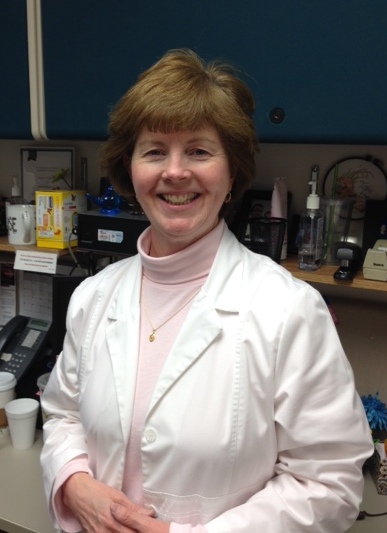 |
Teresa Tomeny
RN, BS ’00, MS/CNS ‘06
|
December 2013 – Teresa Tomeny is not afraid of hard work or challenges. While working in maternal child nursing, she returned to study for her BSN from Upstate and started teaching part-time at St. Joseph’s School of Nursing. Although furthering her education was a challenge, she observes: “It was a challenge which many students are facing today. The good news is, it is possible with sacrifice and hard work!”
Once she completed her MSN as a clinical nurse specialist with a minor in education at Upstate, she chose to move to a full-time faculty position at a community college. After three years, she returned to bedside nursing in hematology/oncology at University Hospital. A year later, Teresa was selected for a CNS opening. “I worked as a CNS in quality and patient safety for the next two years. I learned so much – it was a very valuable experience!”
Today Teresa is a nursing case manager at University Hospital, acknowledging that her work is a culmination of all her past experiences and education.
“I’m a float case manager which allows me to work in all different areas of the hospital, from pediatrics to the adult ICU. I am able to interact with patients, families, nurses, doctors and all the disciplines involved in each patient’s care. Communication can be challenging at times, but I keep the focus always on the goals of care.”
Teresa is not only active with her church, but also volunteers on the Nursing Alumni Association Board of Directors. “I give back in order to support the College of Nursing to help ensure the quality education students receive,” she commented.
She continues to recognize the value of the college’s programs in her career: “I plan to return to school in the spring to obtain my certification in nursing case management.”
New CRNA Thrives in OR
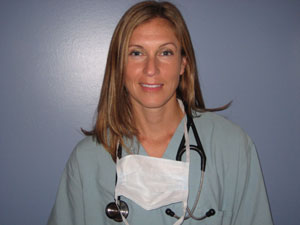 |
Shannon Hourigan, RN, MS-CRNA
Syracuse, NY
BS Degree, Class of 2004
|
In December 2009, Shannon Hourigan became a certified registered nurse anesthetist (CRNA).“I wanted to be an advanced practitioner and also knew there was a large demand for this specialty.”
As the number of surgeries increase, the US Labor Department predicts a high demand for CRNAs, particularly in inner cities, rural areas and in hospital outpatient facilities. According to the American Nurses Association, CRNAs provide over 60 percent of the anesthetics delivered to patients in the US.
Hourigan always had a good example at her side -- Margaret Wade, DNP, RN, FNP -- someone well known to the College as an alumna (BS ‘04/MS ‘05) and assistant clinical professor in the graduate program. She also happens to be Hourigan’s mother. They both completed the BS program in 2004. “It was great taking classes together and having a study partner.”
Becoming an RN in 1998, Hourigan worked nine years at St. Joseph's Hospital -- seven years on a telemetry floor, one year each in labor and delivery and surgical intensive care. While continuing to work, Hourigan completed courses at Upstate for her BS degree and was inducted into Sigma Theta Tau. She went on to complete the 26-month full-time CRNA program at Albany Medical College, earning an outstanding academic/clinical achievement award. She is now certified.
“It was a lot to take on, but it was well worth it. I love being a CRNA. A CRNA has a lot of responsibility and that is exciting to me. In essence, I am in charge of the patient while they are asleep and I have to protect and keep the patient safe in this vulnerable situation.” In addition to having expertise in pharmacology and chemistry, one has to be flexible to deal with the ongoing changes that may occur in the operating room, she noted.
While the CRNA works, a physician/anesthesiologist rotates among two or three ORs, checking in on critical care procedures or other situations as necessary. “Hospitals find that using CRNAs is more cost-efficient for them,” Hourigan said.
Averaging four to five surgeries a day, and as many as 10, Hourigan said that schooling prepared her for all types of surgeries, for newborns to geriatrics. She is gaining new experiences every day at St. Joseph’s Hospital, employed by the Anesthesiology Group of Onondaga, PC.
“While there is a lot of responsibility in being a CRNA, I find it very rewarding,” she commented. “The demands of an aging population and increased acuity of patients creates new demands and challenges every day. I am very happy with the choice I have made.”
Severance Leader in Pediatric Care
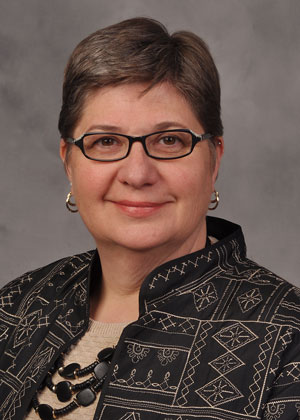 |
Leanna Severance, RN, BS
Delphi Falls, NY
BS Degree, Class of 2001 |
Her father a physician and her mother a nurse, Leanna Severance understood why healthcare called her as well. “I knew my parents had rewarding careers, and I am drawn by my love of children. I’m a big kid myself. I enjoy taking care of and interacting with them, so I knew pediatrics was my field.”
For nearly 30 years, Severance had been a mainstay at the bedsides of children at University Hospital (UH). “Children have an ability to recuperate in a unique way, different from adults,” she found. “Kids know how to play and have fun. The younger ones haven’t learned yet how to say no, so they are able to get up and move on more easily.”
After graduating from Auburn Memorial Hospital with her RN in 1974, Severance served as a Pediatric Intensive Care Unit nurse at UH for many years. She worked her way to become a manager of several pediatric units. She went away one year to serve as a traveling nurse, she noted, enabling her to see and gain work experience in California, Arizona and Maryland.
Severance realized that, “for director-level advancement, I needed a bachelor’s degree.” She enrolled at Upstate’s College of Nursing and graduated in 2001 with her BS. The same year, Severance was promoted to Associate Director of Nursing for Pediatrics at UH, now located in the Golisano Children’s Hospital. In 2005, she was given responsibility for both pediatric outpatients and inpatients.
Pediatric nurse managers report to Severance along with a variety of different levels of staff, including the child life specialists, family therapist, music therapist and art therapist. She is responsible for budgeting, strategic planning and program development as well.
“Upholding patient care quality is always our goal in working together.”
In addition to her work, Severance played an active consultant role in the design of the innovative Golisano Children’s Hospital which was at least a five-year planning process. “I helped with setting the clinical nursing work functions and logistics into the building’s design. Each child’s room, for example, has nursing equipment and supplies, so nurses aren’t bogged down looking for supplies. The design allows staff to be right outside of the rooms, making them readily available to the children and their families. The Golisano Children’s Hospital also offers a Family Resource Center, family lounge and a sleeping area – which means not only that we are patient-centered, but family-centered in our care.”
Severance continues to assist with fundraising for the hospital, currently with the Donor Caring Wall and other projects that help support program development, toys and equipment needed for its young patients. “The children really benefit from the variety of staff such as the child life staff, and music and art therapists.” Those contributing will have their names inscribed on a special wall in a children’s unit that was unveiled in the spring.
Severance says alumni have always been there to help. “We have had a great, collaborative relationship with the College of Nursing -- for recruitment, continuing education, you name it. We have a strong contingent of alumni who work here and we can always count on our alumni everywhere to support important community programs, such as this.”
Severance has also taken a leadership role in the Central New York Chapter of the Society of Pediatric Nurses -- elected its president in 2010.
More information about giving to the children’s hospital is available at www.upstate.edu/gch or by calling the Foundation of Upstate Medical University at 315-464-4416.
NP Alumni Take Medical Mission to El Salvador
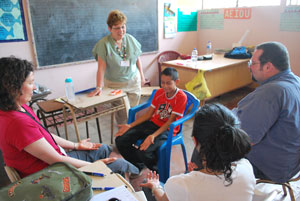 |
Bambi Carkey (ANP/MS ’00) (standing) with her students, Amy Mayer (left) and Mike Perry (right), teach a young El Salvadoran boy relaxation techniques. |
During a seven-day medical mission to El Salvador in February 2010, two faculty members and two graduate students of the College of Nursing saw up close what poverty and violence have wrought upon the health, particularly the mental health, of its citizenry.
Alumna Bambi Carkey, who headed the Upstate contingent, is clinical assistant professor of the College’s Psychiatric Mental Health Family Nurse Practitioner master’s program. This was Carkey’s fourth visit to Central America, under the aegis of the Episcopal Diocese of CNY.
“In El Salvador, there’s a very high need for psychiatric practitioners,” she commented. “Survival alone is extraordinarily difficult with general poverty, lack of clean water, food and infrastructure. On top of that, there are serious mental health issues stemming from domestic violence and recent civil wars and natural disasters (earthquakes) -- experiences that can cause post traumatic stress disorder (PTSD), anxiety and depression.”
Carkey had set up “a system whereby we conducted diagnostic interviews on individual patients, saw families for assessment, prescribed psychiatric meds and referred patients to the El Salvadoran follow-up medical team.” The Upstate group was attached to the El Salvadoran team, comprised of a physician, dentist, psychologist and social worker who visit villages on a monthly or quarterly basis.
“For our part, the students and I served as psychiatric health care providers in a health campaign to five villages where we conducted mass screenings and treatment. People were referred to us for a variety of mental health complaints, including PTSD related to the ravages of civil war there just a decade ago, as well as affective disorders related to wide-spread oppression, poverty, hunger and gang violence.”
“I was privileged to take two psychiatric NP students with me on the mission for the first time -- Amy Mayer and Michael Perry,” said Carkey. They both will complete the master’s degree program this May, and were in the thick of patient screenings there, from demonstrating relaxation techniques to families, to identifying bipolar symptoms in individuals.
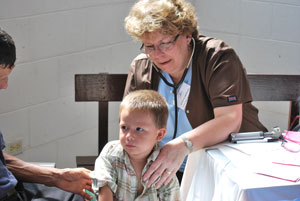 |
Joyce Scarpinato (PMAC ’09), a pediatric FNP, listens to an El Salvadoran boy’s chest at a rural clinic. |
It was Joyce Scarpinato’s first overseas mission. Pediatric/family NP and clinical coordinator of the College’s PNP program, she saw firsthand how the health of children and families were being affected by conditions there.
“The medical mission moved me both personally and professionally. The mothers and their children reflect life in a simple form with the family highly valued. I also realized that I had been drinking water without a thought my whole life. The contaminated water in El Salvador with the parasite infection that keeps repeating itself with children and their families is alarming and effects a child’s growth and development.”
“We know that interventions and change come slowly,” she commented, “but hopefully, such medical missions can continue to work on improving the quality of life of the El Salvadorans with health care prevention.”
“Global health issues are woven throughout the nursing curriculum,” Carkey added. “We need to pay attention to them because global issues affect us all.”